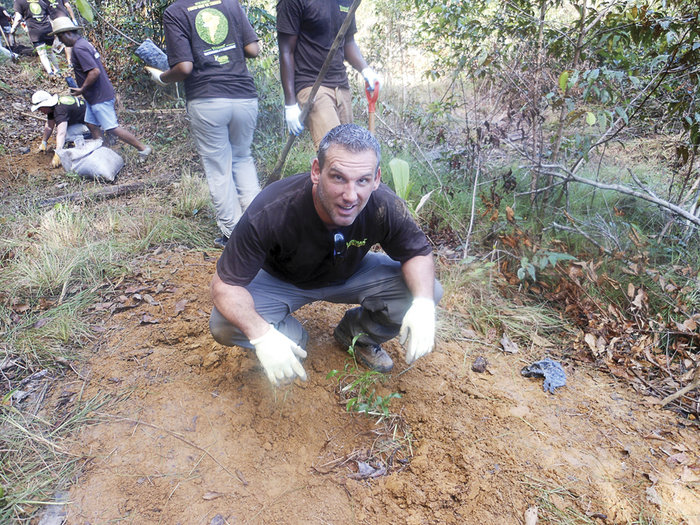Normally, John LoPresto returns to his home in Weehawken, where he’s lived for 14 years, from his day’s work explaining the benefits of switching to green and clean energy to New Jerseyans, and sleeps in a normal bed like most people do.
On May 7, after grilling a fresh-caught meal under the Amazonian rainforest canopy, he and his fellow Viridian Energy independent associates decided to set up makeshift hammocks in the jungle and sleep under the stars. Five minutes in, as they all gathered in awe around what they thought was yet another harmless indigenous snake, their local guide flipped out, stabbed it dead with a stick of bamboo, and lifted it into the air with a machete.
It was a bushmaster snake. One bite from the highly venomous pit viper – the most deadly in South America – and the victim is dead within 12 minutes.
“The rainforest is responsible for almost 50 percent of the oxygen we breathe on this planet.” – John LoPresto
____________
This is how he and his cohorts, or “voluntours” as he called them, spent the second night of their third biannual tree planting excursion hosted by Viridian to the deforested areas of the Mamori region as part of the Amazon Preservation Project. During this particular five-day trip, 29 participants planted 600 new trees and indigenous plants. Their goal is to plant 5,000 over the next 10 years.
“I’ve always been into the green movement and supporting companies that support the planet,” LoPresto said. “Once you’re on the mission, you realize you’re doing something most people only dream about.”
Kickin’ it in the Amazon
“The rainforest is responsible for almost 50 percent of the oxygen we breathe on this planet,” LoPresto explained. “The whole thing just blew me away, and being a Jersey City kid who grew up with a passion for the environment really brought it home for me. I felt so lucky.”
LoPresto’s enthusiasm for the environment, for the trip, and for life in general accompanied every word he spoke as he described the thrills of eating raw chicken caught from the wild, peacock fish right out of the river, and mangos and papaya plucked from trees.
“It’s the most amazing thing,” he said. “We could learn a valuable lesson about sustainable lifestyles and healthier diets this way.”
Max Maia, who runs Turtle Lodge just off the Amazon River, has owned the property for as long as he can remember, LoPresto said. At one point Maia sold off part of his land, once densely forested, and he was devastated to find the buyers had completely razed what they bought.
So Maia bought it back, and now, in the process of undoing the damage the buyers had done, he uses the reacquired land to teach tourists about reforestation and indigenous plant life. For instance, LoPresto learned that there are over 100,000 species of trees in the rainforest alone, and that beneath them thrive “crazy” things like black speckled Caymans (alligators), gigantic tarantulas, and poisonous plants of many varieties.
He also learned that during the rainy season, the end of which LoPresto experienced on his visit, the river is 40 whole feet deeper than normal in every direction, which makes for some fascinating boat trips.
“Imagine boating through tree trunks,” LoPresto posited. “Fantastic! As a part of this trip, you don’t just see the Amazon. You’re in the dirt, you’re putting trees back in the soil, and you’re responsible for years and years of second and third growth areas.” Hence his term ‘voluntourism.’
Why green energy?
“Coal was used in the 1850s to power locomotive trains. Are we still driving around on horse and buggies? No,” LoPresto said. “In addition, coal is the most polluting energy in the industry right now.”
And nuclear energy is no better, he added, and cited Fukushima as an example. In his experience, people on the whole want to do their part to help the environment, and so have gotten on the recycling and energy efficient light bulb wagons.
“What makes more sense is to choose a cleaner source of energy,” LoPresto explained. “It’s the same bill, the same service, the same meter reading, and there is no hardware involved. The switch has more of an impact than all of the recycling you could muster in 20 years.”
When the economy went south, LoPresto was working for a planet-conscious, biodegradable faction of Amazon.com, and he decided he wanted something different. And that he wanted to work for himself. He found that opportunity as an independent associate with Viridian when they hit the Jersey market in February of 2010.
“It’s not a matter of convincing someone to buy something they don’t need, since we all use energy,” he said. “People are incredibly cynical, analytical, and hypocritical when faced with new things, but a change that saves money and the planet at the same time is a no-brainer.”
In six weeks, 26,000 residents had made the switch, he said, and he realized he had found his niche.
“It’s become my mission,” LoPresto added. “It makes more sense than anything I’ve ever done in my life.”
For more about the Amazon Preservation Project, visit www.viridiansustainabilityinitiative.com.
Gennarose Pope may be reached at gpope@hudsonreporter.com
